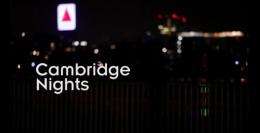October 31, 2011 report
'Cambridge Nights': a late night show for scientists

(PhysOrg.com) -- While it’s not uncommon to see scientists on TV, most of the time it’s just for a few minutes on the news to comment on a recent event or major discovery. A new late night show called “Cambridge Nights” coming out of MIT’s Media Lab is changing that by providing an outlet for researchers to talk about their work in a slower paced, conversational setting. The first episodes of the show are being posted at http://cambridgenights.media.mit.edu.
Similar to how Leno, Letterman, and John Stewart interview interesting people in pop culture, Cesar Hidalgo, ABC Career Development Professor at MIT’s Media Lab, interviews academic professionals about their research, their life stories, and their views of the world.
So far, eight episodes have been filmed, each about 30-45 minutes long. The episodes are being released every Wednesday, with the fourth episode appearing this week. The three episodes that have been released so far feature interviews with Marc Vidal, Professor of Genetics at Harvard Medical School; Geoffrey West, former President of the Santa Fe Institute; and Albert-László Barabási, director of Northeastern University’s Center for Complex Networks Research.
Due to the laid-back setting, the guests are able to tell stories that span their careers, peppered with interesting bits of trivia. For instance, as West discusses his research on how metabolism scales with an organism’s body mass, he notes that life is often marveled at for its diversity, but no less intriguing is how the characteristics of all known life forms follow some simple physical and mathematical laws. Even the arrangement of trees in a forest follows a formula, despite looking random, he explains.
As the shows are not pressed for time or commercial breaks, the guests are allowed to take their time while talking without being cut short by frequent interruptions or confrontational questions.
“Guests are not asked to simplify or condense their narratives,” according to the “Cambridge Nights” philosophy. “We invite them because we want to hear what they have to say, and we want to give them the time to say it comfortably. There are many high-speed formats out there. ‘Cambridge Nights’ is an alternative where thoughts can be developed and reflected upon without the need to rush.”
For these reasons, the researchers who have appeared on the show so far have given positive feedback about the new outlet.
“The guests have loved the format,” Hidalgo said. “Scientists tend to be long-winded, since they have a lot to say and are careful about making distinctions. An open and relaxed format has suited them well and they have been very happy.”
While the rest of the episodes of the first season continue to be released through the end of November, the show is currently preparing for the next season.
“We are also getting ready to film season two,” Hidalgo said. “The plan is to film during the winter and release again next fall. We are shooting for 8 to 10 episodes for season two. Currently, our plan is to continue doing this yearly.”
More information: http://cambridgenights.media.mit.edu
© 2011 PhysOrg.com

















